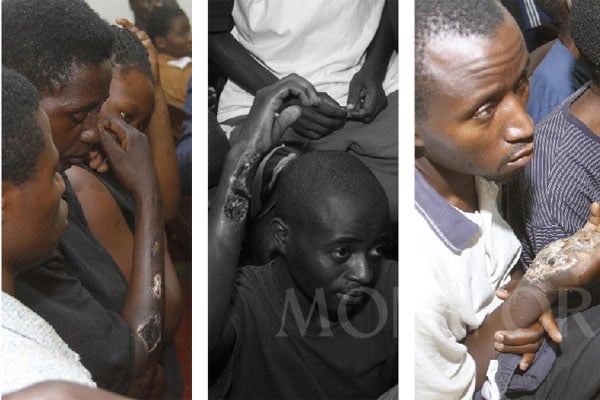Prime
US underlines commitment to countering acts of torture

Some of the suspects who were arrested after the Kasese killings display their wounds in the Jinja Magistrate’s Court on December 14, 2016. The suspects say they were tortured by security. PHOTO/ ABUBAKER LUBOWA
What you need to know:
- Opposition leaders have asked the US to use its power and call the perpetrators of abuses as well as the government to order.
The United States (US) has refuted claims that its issuance of statements condemning alleged acts of torture and human rights abuses by Uganda’s security agencies is mere posturing.
The US Embassy spokesperson, Mr Tony Kujawa, on Friday said the statements are intended “to convey our government’s position on a given subject.”
He added: “If we issue statements regarding the human rights record of any government, it is usually in association with actions taken by officials of that government that contravene the commitments that government has made to its own people and to the international community to adhere to universally held principles.”
On February 4, the US issued a statement citing “recurring credible accounts” of forced disappearances and torture by the security forces which “reflect poorly” on the government of Uganda.
This came after satirical novelist, Kakwenza Rukirabashaija went public with his experience of torture. The US urged the government of Uganda to protect the rights of Ugandans and bring to account the perpetrators of abuses.
Same old story?
While the statement was generally well received, the Leader of the Opposition in Parliament, (LoP), Mr Mathias Mpuuga believes more can be done.
Mr Mpuuga particularly points to the annual Country Reports on Human Rights Practices published by the US’ Department of State.
The reports—published regularly since April 2011—have made it abundantly clear that acts of torture are on the rise.
“Their condemnation of acts of the abuses is welcome because they are identifying with people that are suffering and whose dignity is being degraded,” Mr Mpuuga said, adding, “But we are saying that they could do more because they have been at the helm of supporting this regime by way of grants and donations and they have sanction power. They are big brothers. They should never stay their sanction power.”
Mr Mpuuga said the US has the capacity to call the perpetrators of abuses and the government to order.
“They have offered a lot of training to the military, the police and other forms of security. They can call them to order because part of the training they give them is to appraise them to a state of professionalism. The question is, is their training in vain?” Mr Mpuuga wondered.
Mr Kujawa, however, said the US law prohibits the provision of training or assistance to any security force units or members responsible for human rights violations. It is, however, not clear whether this means the US has ceased providing military assistance to Uganda.
This is not the first time the Opposition has accused the US and other development partners of not doing enough to stymie human rights abuses.
Last February, Dr Kizza Besigye accused the international community of doing nothing to address the increasing human rights violations in Uganda.
Bark without bite?
In the Friday statement, Mr Kujawa said the US usually expects governments to follow up on its statements with some kind of punishment for those implicated in acts of abuse.
“Our expectation is that those officials will be held accountable for the crimes they have committed,” said Mr Kujawa.
Mr Mpuuga, however, argued that statements should be followed by some stern action as has been seen elsewhere.
“What the regime here is doing is what Saddam Hussein and Gaddafi did to their people. Did they simply write letters? They moved an extra mile to show displeasure. That is what we are talking about,” Mr Mpuuga said.
Mr Kujawa, however, said the US “is committed to using its full range of tools to counter serious human rights abuses and repressive acts across the world.”
He added: “The United States will continue to speak out against rights abuses and we will continue to take concrete measures against individuals responsible for human rights abuse or undermining democracy.”
He said in April 2021 the US announced visa restrictions on those believed to be responsible for, or complicit in, undermining the democratic process in Uganda, including during the country’s January 2021 general elections and the campaign period that preceded it.
Mr Kujawa also noted that the US announced sanctions against Gen Abel Kandiho for his involvement in gross human rights violations. Gen Kandiho is the second UPDF senior officer—after the former Inspector General of Police, Gen Kale Kayihura—to be sanctioned.
Whereas the identities of some of the people who are not eligible for US visas have never been made public, the sanctioning of Gen Kandiho brought to 14 the number of Ugandans sanctioned by the US. The Ugandan government has always been quick to label the sanctions as toothless. In a previous interview, junior Foreign Affairs minister, Mr Henry Oryem Okello, called such sanctions inconsequential.
He said: “Let us look critically at sanctions imposed on Gen Kandiho. What assets has he got in the US? What does he want in America? He doesn’t need to go and study in America. His children do not need to go to America! So what is the impact of that sanction?”




